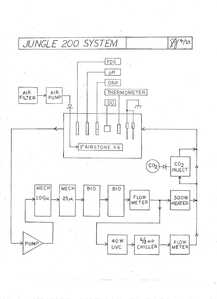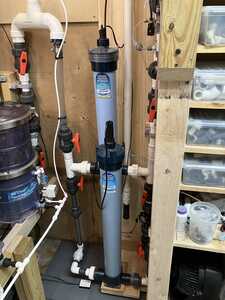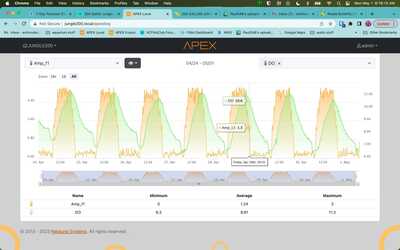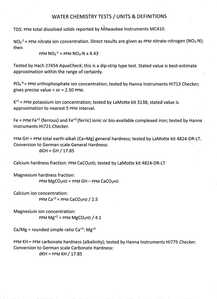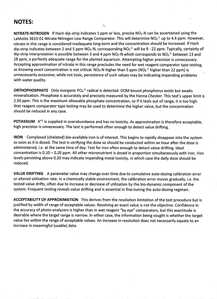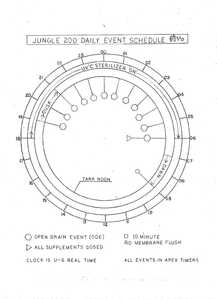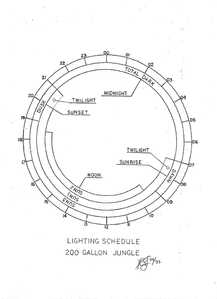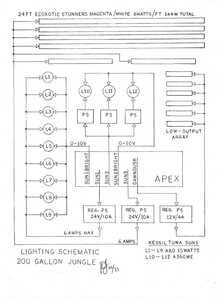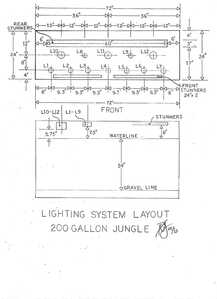Go for it, you had an extensive journal and it was sad seeing it go when the old one bit the dust. we tried saving it and exporting it but there were some compatibility issues we couldn't resolve.
Well, I appreciate that very much!
We are all new members now. A fresh start will be a good thing, especially since I am completely refurbishing the physical plant and implementing extensive system simplifications.
Whatever the plants like, do that.
Finally! Winding up the system revisions and pump room remodel. I installed a new Apex A3 and reprogrammed the entire control system. Pretty much everything is re-wired as well as re-plumbed. Those familiar with my old setup will immediately appreciate the major changes. There is now one main circulation filter loop. I swapped three MD55RLT pumps for a single MD70RLT. There are now two intake tubes instead of three, and the perforated pipe returns are gone in favor of a pair of Loc-line 3/4" discharges with 3" flare nozzles. I think the water distribution with this arrangement is much improved. Filter maintenance is going to be far easier with just the two canister bodies to open.
Another big change I was anxious to make was getting the dosing system out of the aquarium stand and down to the pump room. It's a good fit in the new location and really this is where it belongs. This added about 18" to the vertical; not a significant increase in head for the Milwaukee MP810 pumps.
I installed a lift pump to move water from the RO reservoir to the quarantine/holding tank. I also equipped the waste-water bucket with a float switch and a sump-pump. In general, I took the opportunity to fix some issues that arose over time and gave me a lot of things to think about. For every "I wish I had done that differently" I found the answer and implemented the change.
Since the old forum thread is gone, the history is lost. In future I will be showing some older stuff, with revisions of course. Please bear with me. I am anxious to move on from the engineering to the plants and fish and get this story back on track.
Here is the new layout and a bunch of shots around the pump room.
Whatever the plants like, do that.
Today's numbers
pH: 6.75
TDS: 310 ppm
NO3: 18 - 22 ppm
PO4: 2.13 ppm
K: 30 ppm
Fe: 0.09 ppm
dKH:6.0
CO2: 29.3 ppm*
dGH: 4.1
Ca: 17.6 ppm
Mg: 7.3 ppm
Ca/Mg: 2.4
O2: The current 7-day DO profile below. O2 is in ppm.
The testing protocol for this system is reproduced here for the record.
The current SWCR schedule below. The new ODE is 2 minutes for 4 liters. The demand on the RO/DI source for 12 ODEs daily is 48 liters (12.7 gal). The net new water retention as a percent of tank volume is 6.16%, 46.6 liters, daily. This effectuates a weekly water change of 35.9% and a monthly (30 day) water change of 85.1%.**
Lighting system details are reproduced here for the record.
The new circulatory system is very satisfactory. The one MD70RLT pump is drawing 1.7 amps, just about 40% of the current the three MD55 pumps were using. This is a significant energy savings, as, of course, the pump runs 24/7. The maximum normal flow rate is 570 GPH (2158 LPH). When this falls to 550 GPH the mechanical filters will be changed. The flow rate through the UV/chiller loop is throttled to allow maximum flow rate of 300 GPH (1135 LPH), the theoretical velocity limit for adequate control of protozoan parasites with a 40 watt sterilizer. Assuming complete remix of the water column at the pump influent, circulation with mechanical and biological filtration in-line processes 99.9% of the tank water in 2 hours 25 minutes. This throughput is just under 10 cycles daily. The sterilizer loop processes 99.9% of the tank water in 4 hours 37 minutes. The sterilizer is ON for 12 hours only per day, so the throughput exposed to radiation is about 2.5 cycles daily.*** The irradiation density increases with water clarity, so the advantage of this arrangement is that the sterilizer performance benefits from influent that is polished to 25 microns.
REFERENCES:
*hamzasreef > Freshwater CO2 Level Calculator. This calculator factors in temperature. A precise calculation, better than a PH/KH table lookup. I select the Millero (2002) Approach.
**hamzasreef > Effective Water Change Calculator.
***hamzasreef > Pump Turnover Calculator.
Whatever the plants like, do that.
Swordplants sending out many runners. The E grisebachii 'Tropica' has two, with plantlets. I recently pulled a considerable amount of Sag as it was spreading everywhere as it is wont to do. The lotus sends up a new leaf pretty much every day and is now shading most of the tank. I have turned the lights up to 100%.
Whatever the plants like, do that.
Graphs below are this week's pH, Redox, and Oxygen profiles. Last Friday morning's pH spike shows suspension of CO2 injection during filter change operation. Yesterday's drop in peak DO is due to reduced light (canopy lid up all day).
Today's numbers
TDS: 340 ppm
NO3: 13 - 18 ppm
PO4: 2.27 ppm
K: 20 ppm
Fe: 0.16 ppm
dKH: 5.6 (100 ppm)
CO2: 27.1 ppm
dGH: 4.1 (74 ppm)
Ca: 19.2 ppm
Mg: 6.3 ppm
Ca/Mg: 3.1
These parameters are just about okay, but I am tinkering with them.
Last Friday all the mechanical filters were changed and the bio-filter media rinsed. I drained all four canisters completely for a total 'big gulp' water change of 24 gallons, which is approximately 12% of tank. This maintenance operation, a complete do-it-all cycle in one go, took almost one hour and was very easy to do. This system revision was really worthwhile; it is sooo much simpler!
Whatever the plants like, do that.
Today's numbers
pH: 6.75
ORP: 530 mV
TDS: 340 ppm
NO3: 13 - 18 ppm
PO4: 2.50 ppm
K: 40 ppm
Fe: 0.90 ppm
dKH: 5.7 (101 ppm)
CO2: 27.4 ppm
dGH: 5.4 (80 ppm)
Ca: 21.6 ppm
Mg: 6.3 ppm
Ca/Mg: 3.4
The waterlily flower lasted three days, which is normal. Nymphaea rubra is a tropical, as opposed to temperate, or "hardy", waterlily. It is protogynous, with the female phase presenting on the first diurnal cycle. It then closes briefly. On the second and third diurnal cycles, the flower opens wide and presents its stamens fully. On the fourth day the plant has ceased supporting the flower. These pics are that sequence. This fascinating plant moves large amounts of matter between the emergent organs and the rhizome. Having an aerial advantage, it very effectively ventilates the substrate. I try to allow at least four floating leaves at a time. It is an environmental keystone in this habitat. It produces new leaves constantly and growth is rapid. When I planted this waterlily, I set a second tuber on the right end of the tank, but nothing ever came of it so I assumed it did not "take". Today it has sent up two small leaves, so perhaps it awakens. Two of these very big plants will be a challenge, but I hope to see it thrive.
Yesterday AM regular maintenance was performed. The mechanical filters were changed and all the bio-media rinsed, with a consequent 12% water change. This required about an hour, as usual. I opened the flow meter sensors and cleaned them with citric acid as they were not reporting reliably. It takes about a half hour or so to do both sensors. The main system circulation flow rate is 500 gph, and the UV exposure rate is 100 gph.
The SWCR continues to operate according to the event schedule shown in the previous above post. The SWCR and the auto-dosing regimen are balancing very nicely. I have turned all the Tuna Suns up to 100% brightness to allow for the extensive shade provided by the waterlily's big leaves, and dropped the dimming feature altogether. The fish appear happy and healthy - and hungry! I am feeding quite a lot of fresh frozen again. Nitrate and phosphate levels are stable.
Whatever the plants like, do that.
Erratum. In "Today's numbers" list, last post above, dGH should be 4.5, not 5.4. 80 ppm GH is correct; 4.48 dGH is the exact calculation.
Whatever the plants like, do that.




